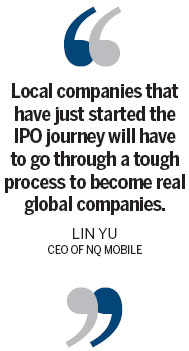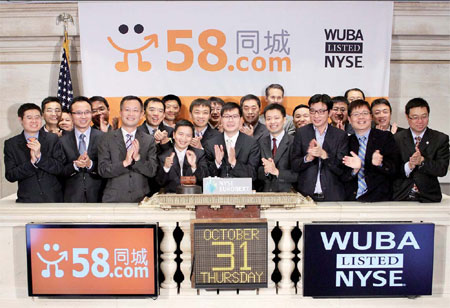Return of the listing fever

Chinese firms plan more overseas floats after good response in US capital markets
Record responses to the initial public offerings of two Chinese Internet companies on US bourses has once again opened the floodgates for overseas listings by Chinese companies.
With the IPO pipeline on the mainland grinding to a halt in October 2012, and no fresh approvals since, the fund-raising plans of several Chinese companies had been jeopardized. Adding to the problems was the negative sentiment on US bourses due to accounting scandals involving Chinese companies and attacks from short-sellers.
Industry experts estimate that several Chinese companies will now consider IPOs in the US so they can take advantage of the prevailing bullish sentiment.
Qunar, a popular travel website owned by Chinese search engine Baidu, nearly doubled its initial share value on its opening day on Nov 1 by raising $167 million.
The company's shares opened at $28.35 and closed at $28.40 on the first day of trading. The estimated price for an American Depositary Share of the company two weeks earlier was $9.5 to $11.5.
Beijing-based 58.com, an online marketplace active in about 380 Chinese cities, saw its shares surge more than 45 percent on debut to $24.12 per share. The company raised $187m from its initial public offering after pricing its shares at $16 each.
Paul Lau, a partner of KPMG China, said the IPOs of 58.com and Qunar will open a new window for Chinese tech startups in the US capital markets.
"The US capital market is steadily recovering and we are expecting at least two or three more China IPOs by the end of this year," Lau says."Going forward, there is no reason why this number cannot go up."
Tech and Web firms are still the most favorable candidates for US investors. China's Web fever has helped boost valuations of several Internet companies. The nation had more than 590 million Internet users as of June, accounting for nearly half of the total population, according to China Internet Network Information Center.

"The Chinese government has made a series of policies to promote the information process, and gradually realized the construction efficiency of basic network facilities in 2012; and popularity of broadband Internet and construction of mobile network directly promoted the use of Internet," said CINIC.
Autohome Inc, China's largest car-selling website, has filed for an IPO of up to $120 million ADS. The company said it would use the proceeds from the IPO to invest in research and development and for sales and marketing efforts.
China's ongoing urbanization and growing automobile demand will offer websites such as Autohome a golden chance to increase income and expand market share, experts say.
Real estate website anjuke.com and online advertising agency AdChina Ltd are among the other firms planning overseas IPOs, according to Guangzhou-based newspaper 21st Century Business Herald. Both the companies, however, did not disclose any details of the IPO.
Another reason for Chinese companies rushing to overseas stock markets seems to be tight control over IPO approvals on the Chinese mainland. China has halted IPO approvals for more than a year, with nearly 700 local companies on the waiting list, according to a Xinhua News Agency report.
The US, home to Internet giants such as Facebook, Google, Microsoft and Amazon, has been the hottest destination for tech companies in China since 2000.
In 2010, there were 40 Chinese companies listed on the US stock markets, but a series of financial scandals seemed to have disrupted Wall Street's confidence in 2011. The number of China IPOs slumped dramatically to two in 2012.
Five Chinese companies have so far listed shares on the Nasdaq and New York Stock Exchange this year. According to data provided by financial service platform Dealogic, the amount raised was above $4 billion in 2010.
The small number of Chinese companies that were listed after 2011 are generally "doing well" in terms of share price performance, KPMG's Lau says. "The two companies listed in 2012 have seen their share prices surge up to multiple times the IPO price."
A passive economic outlook and negative attitude toward Chinese companies have also led to lower valuations.
According to Lau, the e-commerce giant Alibaba Group Holding Ltd's potential US IPO will give further momentum to other local companies that are planning a US listing. Alibaba is said to be actively considering a US listing after its Hong Kong listing plans went awry.
The Hangzhou-based company is expected to raise $18 billion to $25 billion in a January or February public offering, according to Reuters. If Alibaba's offering happens, it will be the biggest Internet IPO since Facebook Inc's $16 billion IPO in 2012.
Though the US is still the favorite market for Internet companies, enterprises in traditional sectors such as energy, shipping and telecom are eyeing European IPOs.
However, the debt crisis in the European Union is hurting investors' confidence, analysts say, adding that it would push more Chinese companies to New York.
At the same time, Chinese companies also need to be wary of attacks from short-sellers, analysts say.
Last week, the market cap of New York-listed NQ Mobile Inc, a Beijing-based smartphone security company, almost halved after Muddy Waters LLC, a US short-seller, said NQ was marking up its market share.
In October, the US investment research company said at least 72 percent of NQ's purported 2012 China security revenue is fictitious."NQ Mobile is a massive fraud," said a Muddy Waters report. Although NQ Mobile quickly denied the allegations and filed a lawsuit in China against Muddy Waters, its stocks continued to sink. More than $560 million of market value has evaporated since Muddy Waters made a "strong sell" recommendation of the Chinese company, according to a Bloomberg News report.
"Chinese companies who are listed in overseas markets need to adopt a more transparent management process," says Lin Yu, CEO of NQ Mobile. He says that Chinese companies may need more time to learn how to improve their capabilities in financial forecasting and risk control.
Short-sellers usually attack the companies that have landed in the US market by acquiring a shell company in the listing market and assuming its stock rights. The reverse mergers open a backdoor for companies that may not qualify for an IPO.
"Local companies that have just started the IPO journey will have to go through a tough process to become real global companies," Lin says.
gaoyuan@chinadaily.com.cn
| The management team of 58.com pose for pictures on Oct 31 after ringing the opening bell at the New York Stock Exchange. Provided to China Daily |
(China Daily European Weekly 11/08/2013 page23)
Today's Top News
- Xi stresses improving long-term mechanisms for cyberspace governance
- Experts share ideas on advancing human rights
- Japan PM's remarks on Taiwan send severely wrong signal
- Key steps to boost RMB's intl standing highlighted
- Sustained fight against corruption urged
- Xi calls for promotion of spirit of volunteerism































